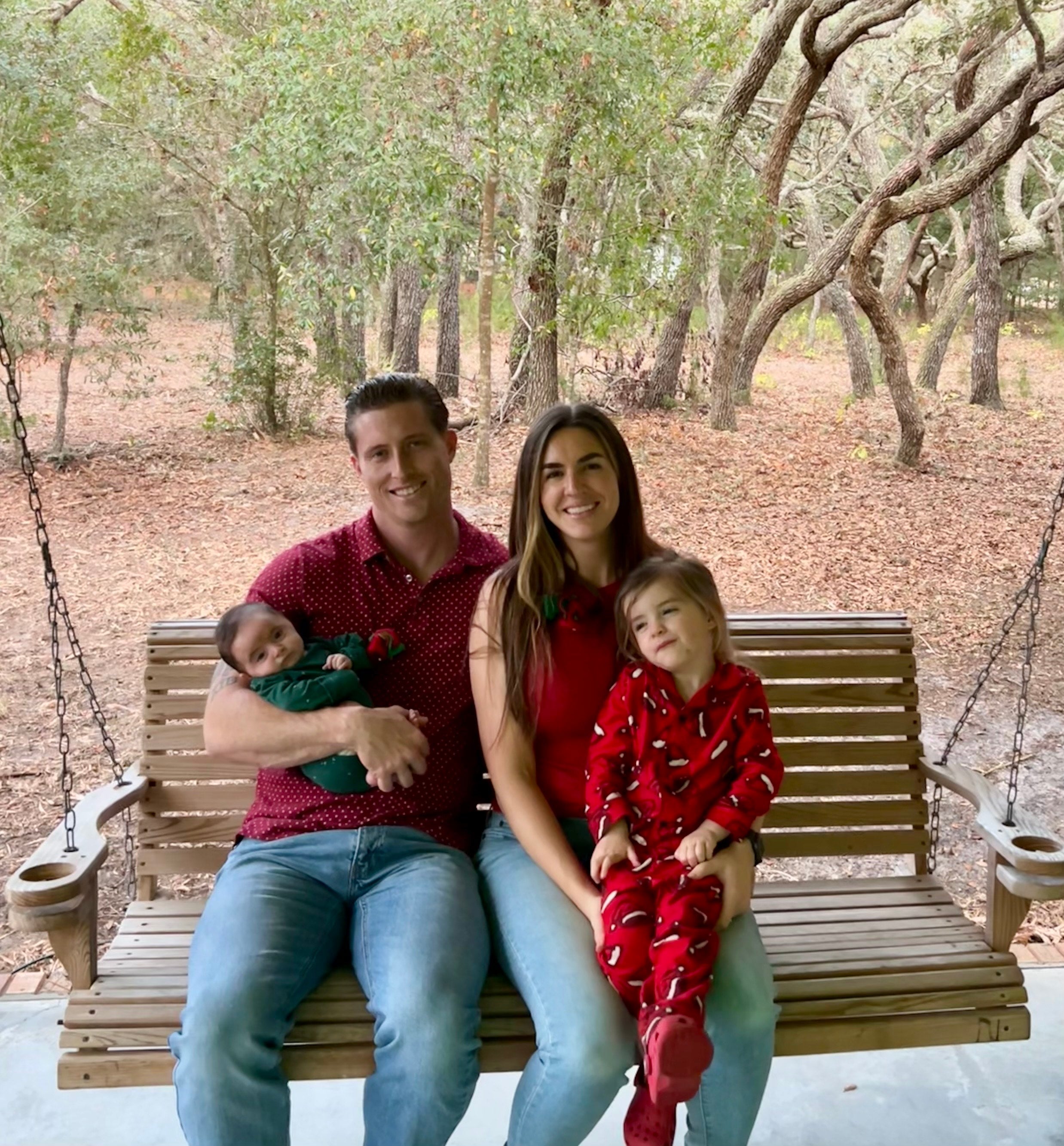Happy half-birthday to your little one! If we were to ask you how those first six months went in terms of your baby’s (and your) sleep, we’re willing to bet you’ve had many hard nights along with a lot of success to celebrate. At this age, new patterns are emerging which means you’ll need to tweak your 6-9-month-old’s sleep schedule.
In this article about your 6-9-month old we'll cover:
- some of those new patterns you can expect in terms of your child’s sleep between the ages of 6 and 9 months,
- a sample schedule you can adjust to fit your baby’s unique needs,
- Challenges babies go through at this age, and
- tips for maintaining your baby’s new schedule
We were lucky to partner with Brittany Levine, Certified Pediatric Sleep Consultant, of Rest is Best Sleep. Look for her expert advice as we guide you in your 6-9-month-old's sleep.

Changes Ahead for Your 6 – 9-Month-Old
If you feel like all you did those first 6 months of your baby’s life was hold them, feed them, and work hard to teach them to sleep…that sounds about right! In our “Sleep Schedule for Your 4-6-Month-Old” article we went over how important it was to start nailing down a flexible schedule for your baby in order to help them learn to be an independent sleeper.
As your baby's sleep needs evolve, you'll still want to focus on helping them fall asleep on their own.
Here are some changes you can expect to see between the ages of 6 and 9 months:
- More sleep will be consolidated at night
- Most babies will nap longer which means soon 2 naps will be enough
- New teeth will start to come in
- Separation anxiety may occur near the end of this age range
- Dream feed should no longer be required
- Lots of developments like getting more mobile
Sleep Needs to Consider When Creating Your Own 6 – 9-Month Old’s Sleep Schedule
Before you move your baby into a new schedule, you’ll want to consider your baby’s changing needs and also consider the schedule that you were working with prior. This will allow you to shift into a new schedule that works for your baby and also fits into your family's unique lifestyle.
Here's what to know about sleep and nutrition needs for your 6-9-month old:
- Your baby will need about 12 and 15 hours of sleep in 24 hours.
- 10-11 of those hours will be consolidated into nighttime sleep.
- Your baby will likely start this age taking 3 naps; moving into 2 naps as they come closer to 8/9 months old.
- 2-3 hour wake windows are ideal.
-
Stanford Children’s Health recommends that you feed your 6-9-month-old formula and breastmilk about 4-5 times per day (for a total of 30 - 32 ounces) in addition to a range of solid foods.
- Don't expect your baby to completely sleep through the night yet. However, up to 8/9-hour stretches is normal with some babies getting very close to all the way through the night by the end of the 6-9-month age range. For more on when you can expect your baby to sleep through the night read our article all about it!
Overall, you want to aim for a full, well-rested, and happy baby and that’s what matters most.

Sample 6-9-Month-Old Sleep Schedule
Below we’ve provided a sample sleep schedule that works well for babies at this age.
While it can do wonders for many babies to have them on a schedule similar to this one, no two babies are the same! Your family’s routines and daily schedules differ from everyone else’s, too. Aim for flexibility and doing what works best for YOU!
A Typical Schedule for a 6 – 9-Month-Old might look like this:
7:00 a.m. – Your baby wakes for the day/First Feed
9:00 a.m. – Nap #1 (1.5 – 2.5 hours)
11:00 a.m. – Feed then play
1:30 p.m. – Nap #2 (1.5 – 2.5 hours)
3:30 p.m. – Feed then play
5:00 p.m. – Catnap if needed (30 - 45 minutes)
5:45 p.m. – Feed then play
7:30 p.m. – Feeding and Bedtime
2 Thoughts:
-Babies at the end of this age range likely won't require that 3rd nap which we'll cover below
-The 2 last feeds may ultimately be consolidated into one, or your baby may prefer to cluster feed. Both normal!
Just because this is “typical” does not mean your baby should be following this exactly. We always want to remind parents to be flexible, because there’s no such thing as a “perfect schedule.” We recommend having a basic framework like this one to work from and go from there. If you're not there yet, that's ok!! You're doing an amazing job.
Additionally, babies are not robots and they are growing and changing every day. Even the very best sleepers will face sleep challenges at this age.
Here is Brittany's biggest recommendation for building a 6-9-month-old sleep schedule:
Stay consistent with their age appropriate wake windows and nap schedule, but don’t let yourself become blind to their changing sleep needs. This age group is typically moving from 3 naps to 2 naps which means they can begin to handle more awake time to practice those exciting skills that come with this age! A lot of parents find themselves afraid of overtiredness so they avoid extending those wake windows. I advise to loosen up on this fear just a bit with a baby 6-9 months old. Look for signs of needing more awake time (taking longer than 20 mins to fall asleep or not taking long naps) and be ready to adapt as their needs evolve!
Challenges That Can Affect Your Baby’s Sleep Between 6 and 9 months
Have a baby who finally sleeps great and thought it would be smooth sailing from here on out? Although your baby is likely taking longer naps and going a much longer stretch at night without needing to feed, setbacks through your baby’s first year are completely normal.
Here are some challenges you can expect at this age and how to get through it.
Teething
Most babies will cut their first teeth between the ages of 4 and 7 months, which makes the 6-9-month age range prime time for teething discomfort. In our article, “Soothing a Teething Baby At Night” we give our best tips for helping your baby through this uncomfortable time which can contribute to disrupted sleep. Who can blame those poor babies?!
Growth Spurts
A growth spurt around 6 months and then again around 9 months is common. With that said, the age varies. However, it’s good to be aware that these are coming! You’ll know because your baby will likely want to eat nonstop and be waking up more often or extra fussy at bedtime. Remember that it’s just a phase and it shouldn’t take them too long to get through it. Making sure they are nice and full is the best thing to do right now.
8-10-Month Sleep Regression (Separation Anxiety)
You may have thought you were through when you made it out the other side of the 4-Month Sleep Regression, but another one is coming for a different reason. In our full article on this topic we write that the 8-10-month sleep regression “relates to separation anxiety - or when your baby starts to show more agitation about the thought of having to be away from you.” Sometime around this age, many babies will go through a period of struggling to fall asleep on their own or frequent night wakings because they miss you! Keeping with your routines will be extra important during this time.
Overtiredness
A big reason that your baby this age might be fighting sleep is the exact opposite reason you’d think and that’s from being overtired. Once a baby stays up past their “wake window” or the amount of time they can happily stay awake, things go downhill fast. If your baby is already fussy or crying because they are super sleepy, it can make going down a huge challenge. Be sure that you are noting those sleepy cues (red eyes, rubbing eyes, staring off into space) and getting them laid down before it’s too late.
So, what's the best way to handle any big change or sleep challenge that's throwing you for a loop?
We cannot recommend sticking to the "plan" as much as possible in these situations enough.
Keep following your bedtime routines that your baby knows best and utilize best practices that induce sleep including:
- dark sleep environment
- white noise
- lots of cuddles
- paci if they take one
- and our favorite: the weighted sack from Dreamland Baby
The gentle weight of Dreamland Baby naturally relaxes your baby to increases your baby's sleep hormones. Keeping your baby calm and relaxed at bedtime is key!

Brittany recommends working as a team to get through sleep challenges with your 6-9-month-old:
"Whether that is just you and your partner or involving your whole village, it’s important to find people whose opinions you trust and feel safe asking for! Don’t be afraid to find professionals to be a part of this team! Lactation consultants, maternal mental health professionals, sleep consultants, doctors, nurses, and seasoned parents can all be great resources for when times are tough. And remember, sleep deprivation can be dangerous in many ways. As a new mother, your hormones are all over the place and lack of sleep can really skew your thinking patterns. Reach out for help! Talk to a mental health specialist. Get advice from your doctors and sleep consultants. It is possible to help babies learn to sleep without leaving them alone to cry and it’s also important for everyone’s health! If you feel like your suffering, you don’t have to in silence."
Other Best Practices for Helping Your 6-9-Month-Old Stick to Their Sleep Schedule
These are our best tips to maximize your baby's sleep at this age:
With that, Brittany would like to remind us all how important having patience is when helping your 6-9-month-old sleep:
"Mentally prepare for some sleep disruption while sticking to your normal routines! This age group has A LOT going on! They’re learning to sit, crawl, babble, and play. They’re getting teeth and recognizing their world more and more each day! Some babies at the older end of this age group are learning to pull themselves up on things, too! It’s a lot of developmental advancement which can mean some rough naps and nighttime sleep. But, it’s a phase and it will pass! If your child doesn’t know how to fall asleep independently, now is a great time to work on that. As far as the other milestones, practice as much as possible during awake time. By doing this, you’re helping to fulfill that need to practice whatever skill their working on during the daytime hours so baby isn’t awake practicing all night."

Contribution by Brittany Levine
Certified Pediatric Sleep Consultant
www.restisbestsleep.com
Bio: I work one on one with families to customize a plan to gently help their little ones learn to achieve quality sleep at night and during naps. Sleep is a vital human need. As parents, we are led to believe that we must give up that crucial element of our health in order to have children. This isn’t true and my mission is to end the stigma that in order to be parents you will always be tired!"


